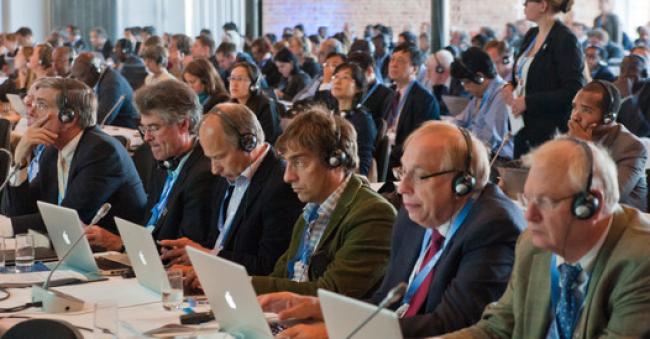Articles Menu

Aug 10 2021
The backdrop for the latest climate report from the United Nations has been a series of terrifying reminders of the unfolding crisis.
In the first ten days of August 2021, the world has been shaken by record-high temperatures, droughts, and out-of-control wildfires. Greece alone has lost 140,000 acres to fires in the past ten days, and catastrophic fires have also raged across Canada and the United States, Italy and Turkey, Algeria and Siberia.
The fires add to a growing list of catastrophic changes: disappearing glacial ice, mass extinctions, critical shortages of fresh water for agriculture, and collapsing pollinator populations.
With 234 authors drawing on evidence from over fourteen thousand scientific papers, the report from the Intergovernmental Panel on Climate Change (IPCC) is comprehensive. And like previous reports, it paints a very grim picture indeed. The report confirms that the extremely dangerous changes to the planet’s land, oceans, waterways, and weather systems can be slowed and in some cases reversed—but only if drastic transformative measures are taken in every part of the global economy.
That much is—or should be—uncontroversial. But the very feature of the new IPCC Report that garners it so much attention—its claim to be rigorously scientific—is something we can ask critical questions about.
Does “scientific” mean that it is free of ideological bias and politically “neutral”? Unfortunately not. Reports of the IPCC, down to each individual sentence, have to be approved by representatives of all the governments participating in the United Nations climate change process.
This process has the predictable effect that controversial or politically challenging claims are systematically filtered out of the reports, especially claims that are perceived as threats to leading industries supported by governments.
It is indeed a scientific report, informed by a vast body of scientific research, but it is also an ideological document. The IPCC report tells us a lot about what is happening, and how, but it also actively covers up key causes of the crisis and insulates powerful systems from critical scrutiny.
By shifting the blame away from corporations and the governments that do their bidding onto the generic scapegoat of “human activity,” the report hides almost as much as it uncovers.
The Report comes in three main versions: a 41-page “Summary for Policymakers,” a 150-page “Technical Summary,” and 4,000-page “Full Report.” In the crucial and widely-read “Summary for Policymakers,” the word “human” appears 79 times.
By contrast, the word “capitalism” occurs zero times, the word “colonialism” occurs zero times, the word “corporation” occurs zero times, the word “business” occurs zero times, the word “money” occurs zero times, and the expression “fossil fuel” (or even just “fuel”) occurs zero times. Even in the Full Report’s 4000+ pages, where the word “human” appears over 800 times, “colonialism” is completely absent, and mentions of “business” and “corporation” are at best incidental.
Have scientists researched the causes of climate change and proven that capitalism, colonialism, corporations and fossil fuel extraction are not key drivers of climate change? Absolutely not. A vast body of research confirms the role these systems and institutions continue to play in driving the Earth to the brink of catastrophic climate change.
Policy makers have known about the threat of climate change for decades and have on the whole accelerated fossil fuel consumption. But the IPCC’s report does not examine the level of vigor political and social action must have to bend political leaders in the other direction before it’s too late.
Solutions are discussed in the vaguest possible ways, purged of anything that could be deemed controversial among policymakers. It is notable that the “Summary for Policymakers” makes no mention of Indigenous peoples, land defenders, water protectors, or any efforts to decolonize and democratize decision-making about land use and resource extraction projects.
We should welcome the latest IPCC Report for its scientific insight. But we should also understand it as an ideological document that obscures the crucial systemic causes of climate change. For advice on what social forces could push forward climate solutions, readers will have to look beyond the thousands of pages generated by the IPCC.
For information on how we might confront capitalism, colonialism and global inequality, we’ll have to look elsewhere: the Indigenous peoples, social movements, and landless peasants leading the way forward.
[Top photo: Delegates at an IPCC working group meeting in 2013 ]